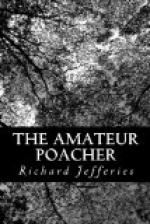At last the secret was revealed by a hare. One day, walking up the lane with the gun, and peeping over into the ploughed field, I saw a hare about sixty yards away. The distance was too great to risk a shot, or rather it was preferable to wait for the chance of his coming nearer. Stepping back gently behind the bushes, I watched him run to and fro, gradually approaching in a zig-zag line that must carry him right across in front. I was positive that he had not seen me, and felt sure of bagging him; when suddenly—without any apparent cause—up went his head, he glanced round, and was off like the wind.
Yet there had not been the faintest noise, and I could not understand it, till all at once it occurred to me that it must be the scent. The slight, scarcely perceptible, breeze blew in that direction: instantly he crossed the current from me he detected it and fled. Afterwards I noticed that in the dusky twilight, if the wind is behind him, a hare will run straight at you as if about to deliberately charge your legs. This incident by the ploughed field explained the failure of the wire. Every other care had been taken, but we had forgotten to allow for the extreme delicacy of a wild animal’s sense of smell.
In walking to the spot selected for the snare it is best to avoid even stepping on the run, and while setting it up to stand back as far as convenient and lean forward. The grass that grows near must not be touched by the hand, which seems to impart a very strong scent. The stick that has been carried in the hand must not be allowed to fall across the run: and be careful that your handkerchief does not drop out of your pocket on or near it. If a bunch of grass grows very tall and requires parting, part it with the end (not the handle) of your stick.
The same holds good with gins, especially if placed for a rat. Some persons strew a little freshly plucked grass over the pan and teeth of the trap, thinking to hide it; but it not only smells of the hand, but withers up and turns brown, and acts as a warning to that wary creature. It is a better plan if any dead leaves are lying near to turn them over and over with the end of a twig till they fall on the trap, that is if they are dry: if wet (unless actually raining at the time), should one chance to be left with the drier under surface uppermost, the rat may pause on the brink. Now that the remotest chance of leaving a scent was avoided the wire became a deadly instrument. Almost every morning two or three rabbits were taken: we set up a dozen snares when we had mastered the trick. They were found lying at full length in the crisp white grass, for we often rose to visit the wires while yet the stars were visible. Thus extended a person might have passed within a few yards and never noticed them, unless he had an out-of-doors eye; for the whiter fur of the belly as they lay aside was barely distinguishable from the hoar frost. The blacksmith Ikey sauntered down the lane every evening, and glanced casually behind the ash tree—the northern side of whose trunk was clothed with dark green velvet-like moss—to see if a bag was lying for him there among the nettles in the ditch. The rabbits were put in the bag, which was pushed through the hedge.




